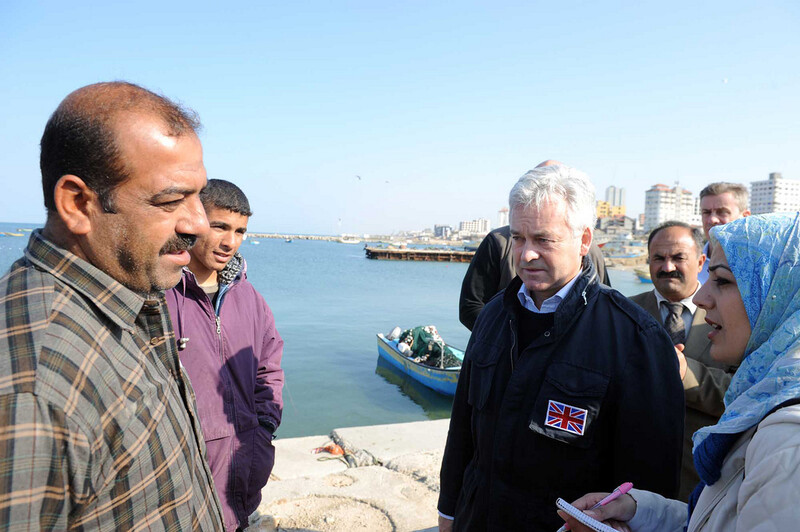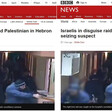Media Watch 26 February 2014

Alan Duncan, Britain’s aid minister, visits fishermen in Gaza; he later told MPs that the Strip may soon not have enough food or clean water.
UNRWAThe headline for the BBC’s Radio 4 program From our own Correspondent earlier this month was “Come to sunny Gaza!” Below it, on the program’s web page, were the words: “Why might our man visiting the Gaza Strip be considering going back there, with his family, for a holiday?”
And so the scene was set for a cheery, holiday-style report from Gaza by BBC journalist Simon Cox.
Cox, who seems to be on his first visit to Gaza, says he had “come prepared for trouble,” kitted out in flak jacket and helmet, only to discover that “Gaza was not such a scary place at all.”
And so he ditches the protective gear to visit pizza restaurants and ice-cream parlours, before filing his radio report and corresponding online article back to the BBC.
The online article is exactly the same as the radio item but the headline has been changed to: “Discovering Gazans’ resilient side.” And there is no problem in reporting on just how resilient Palestinians are.
But what exactly are the Palestinians in Gaza withstanding? Cox does not say. At no point in his reports does the BBC journalist explain, or even mention in passing, that Gaza is under Israeli occupation and siege.
In fact, he seems to be blissfully unaware of this painful reality. Standing at his hotel window, he describes the “spectacular view of the Mediterranean lapping gently at a curve of golden sand” and says this is not what he was expecting from Gaza.
Somehow he manages not to see, as he admires the view, the Israeli gunboats that are ever present on the horizon, waiting to shoot at Gaza’s fishermen as they struggle to make a living for their families.
Nor, at any point during his visit, does he spot the Israeli warships which patrol the waters. And he fails to see or even hear the drones which constantly buzz in the skies above Gaza, causing fear and uncertainty in those below.
Holiday vibe
Or maybe he does see them. But to report on them would ruin the holiday vibe of his piece. Cox’s Gaza is not one of food shortages, blackouts and desperate overcrowding but a place so delightful that he ends by saying he’d like to bring his wife and children back for a holiday.
It would be interesting to see him try. Gaza is sealed off from the rest of the world, its land borders with Israel and Egypt closed, and its sea and air space blocked by Israel. Cox fails to explain this to his audience, leaving the uninitiated to assume that everyone enjoys unrestricted entry and exit.
His own visit, crossing from Israel, would have been facilitated because he is a journalist. But that facilitation is not guaranteed. Israeli journalists, for example, are barred by their government from entering Gaza.
So, just how realistic is it for the BBC to introduce Cox’s radio item by saying that he’s “considering going back there, with his family, for a holiday”? The answer is, not at all.
But surrealism and appalling triteness are not the only themes of Cox’s reporting. His item mirrors the BBC’s consistent theme of reporting on Palestine — it is written with absolutely no context or facts whatsoever.
Deception
The siege and occupation are absent and so is any mention of their instigator, Israel, other than at the beginning when Cox says he’s been driven into Gaza from Israel. He gives a nod to the lack of electricity and high unemployment but these could be the result of mismanagement on Gaza’s part as far as his audience is concerned. No explanation for the power cuts or shortage of jobs is given.
The result is a construction which will lead BBC audiences to believe the situation in Gaza is far better than it really is. In other words, it is a deception.
The reality is that decades of Israeli occupation, compounded by the seven-year siege, have put Gaza on a terrifying trajectory which is leading to it becoming unliveable by 2020, according to a 2012 United Nations report.
The report’s damning warnings were echoed in the British Parliament recently, with MPs from all sides painting a grim picture of the situation in Gaza.
In a debate on 22 January, Britain’s aid minister, Alan Duncan told MPs: “It is no exaggeration to say that, come the autumn, Gaza could be without food, without power and without clean water.” It was a place, he said, that “risks becoming unfit for human habitation.”
Like the BBC’s Simon Cox, Duncan had just returned from a visit to Gaza. It would appear that, unlike the journalist, Duncan noticed that only salty water comes out of Gaza’s taps, saw the refugee camps and the destroyed buildings and gained a real understanding of life there for Palestinians.
The second debate was on 5 February and this debate also made a mockery of Cox’s BBC report. MPs lined up to condemn Israel’s siege — the siege that Cox did not even see fit to mention.
“Hell”
Conservative MP, Sir Tony Baldry, told the House of Commons that, when he returned from Gaza he told his children he had been to “hell.” He added that he could not imagine a “purgatory” of such total hopelessness as Gaza.
Unsurprisingly, he did not say he would be taking his children back to the BBC’s vision of “sunny Gaza” for a beach holiday.
Just days after the BBC broadcast Cox’s singular view of Gaza, its rival broadcaster, Channel 4 ran two items over two days on its evening news program focusing on the Strip.
The difference between the BBC’s report and Channel 4’s reports is shocking. Presented by foreign correspondent, Jonathan Miller, Channel 4 News’s first report examines the destruction of Gaza by telling the story of one family, the Dolas.
His second report looks at Gaza’s health crisis, highlighting the case of Abdel Karim, a three-year-old with a brain tumor, whose parents have been refused travel permits by the Israeli authorities. As a result, their son cannot leave Gaza to access radiotherapy treatment and is dying.
“Running on empty”
Both reports are set in the context of Israel’s blockade and of UN reports on Gaza. “Gaza,” says Miller in his first report, “is running on empty.”
Following the broadcast, Miller tweeted: “After my #Gaza report last night, I’m accused of being anti-Israel & anti-Semitic. I am not. But the siege of Gaza is cruel and shocking.”
So, we have two journalists — one producing hard-hitting, fact-laden reports on a “cruel and shocking” siege, and one who won’t even tell his audience that there is a siege. Whose reports would you believe?
The irony of Cox’s inability — or unwillingness — to write in context is that he was in Gaza to train young Palestinian journalists. Journalists, it should be pointed out, as Cox didn’t, who will find it extremely difficult, if not impossible, to leave Gaza and report on the outside world.
Who knows what they learnt from Cox? What we do know is that a BBC journalist went to Gaza and saw a happy, holiday destination, utterly at odds with the grim experience of British MPs, UN workers and fellow journalists.
From which we can learn that, if you’re looking to the BBC for truth, facts and objectivity in its content, you won’t find it in its reporting on the Israeli occupation.






Comments
Gaza as a Vacation Destination
Permalink Dr Harold Goldmeier replied on
Kudos to Cox. Improve Gazas economy & lowee the violence by flooding Gaza with tourists. It could be the Riviera of the Mid East. Peace will come with prosperity
Response to Mr.Goldmeier
Permalink Tess replied on
To whose violence are you referring here? Please elaborate.
Violence
Permalink Peter replied on
I guess he means that, if we flood Gaza with tourists the Israelis may hesitate before shooting people across the border of killing them from the air... for fear that they might kill someone that might 'matter to them'.
Israel wouldn't let the
Permalink Tess replied on
Israel wouldn't let the tourists in, not because they give a toss about killing them but because of what they would be witnesses to.
Off to Gaza
Permalink Donna Schwarz-Nielsen replied on
I'm off to Gaza next week as part of International Women's day with a delegation of 100 women. I'll be keeping a blog if anyone is interested in one woman's experience behind the wall.
http://destinationgaza.weebly....
Willful misunderstanding
Permalink Luke Coleman replied on
Cherry picking what he didn't say to suit an agenda doesn't serve a cause with which I agree. This was a human interest piece focused on his work as a media trainer. The wrong target was picked here, in the hope no one actually listened to FOOC on this occasion.
Cox was supposedly there to
Permalink Tess replied on
Cox was supposedly there to train young Palestinians journalists, to write about what do you think? Surely the conditions under which they are forced to work cannot be
ignored.
A further point
Permalink Luke Coleman replied on
I'm having this convo on FB, so a final point: In fact, the 'Sunny Gaza' thing is a direct ironic reference to the audience understanding of the suffering there.This commentary on the BBC piece comes from a point of view so utterly obscured to have lost sight of what the wider world knows. It's almost willful, and helps no one. Written with verve and passion, but blinkered.
The link to the FOOC
Permalink Sam N replied on
The link to the FOOC broadcast is provided in the article, so everyone can listen to it (there's no hope that people won't listen to it on this occasion). The broadcast is introduced by Kate Adie, who makes a point of highlighting Palestinian rocket attacks on Israel this year, but doesn't mention Palestinians killed by Israel this year (but no matter, everyone knows what's going on anyway, even if the BBC never mentions it, and this was just a lighthearted broadcast).
I think Cox's piece would have been great if it was a spoof, sending up the BBC's unwillingness to report on the reality of what is happening in Gaza. But it wasn't - it was lighthearted yes, to the point where he didn't even want to mention Israel's strangling siege, but it was still serious journalism.
The fact is that he mentioned none of the realities of the siege and occupation, in order to place his lightheartedness in context. On the other hand, (backed up by Kate Adie’s introduction) he left us with the suggestion that he would like to come back with his family (an impossibility), told us Gaza is neither ‘scary’ nor violent (even though it remains under constant threat of Israeli attack, and a mentally-ill woman was shot dead there by Israeli soldiers on Friday, 28th Feb), and implied that the reality of Gaza is that it is a place of swish hotels and plentiful, readily available food.
This is a distorted, misleading view. In fact, I'd go so far as to say that Cox was cherry-picking in order to suit his own agenda.
Holidays
Permalink John Duqesa replied on
Zionist apologist Goldmeier in these comments suggests flooding Gaza with tourists to "lowee (sic) the violence". What violence? Does he mean the violence from the Zionist Entity which has seen many Palestinians killed and injured this year as they have been every year? Perhaps if there were tourists around, they would publicise how evil the Entity is and BDS would accelerate in strength, a result I would applaud. But no tourist is going to put up with power cuts for 2 hours a day, isolation from other countries, sonic booms daily from Zionist Entity aircraft to torment the inhabitants, salt water coming from taps, lack of goods due to the Entity's blockade and the possibility of being killed in one of the Entity's regular attacks.
The only solution that will "lower the violence" is the disappearance of the Zionist Entity and its replacement by a state for all religions.
I entirely agree.
Permalink Tess replied on
I entirely agree.
Humm, I think you grossly mis
Permalink SH replied on
Humm, I think you grossly mis-represented this (written) article and are reaching a bit much here. While I understand your accusations against the BBC about not being critical enough of Israel this was not the point of this particular article anyway. His criticism and description of the blockade on Gaza are there, just very subtle. Anyone interested in more facts about it (albeit from the BBC perspective) can click on any of the 'related stories'.
Actually, I think this article does have a positive impact as illustrating Gazans as well-educated with all the aspiration and needs of any other kind of people. Most people from the West think of people from Gaza as ultra-radical Hamas types, tinkering away making home-made missiles. Sometime fluffy articles like this are needed to remind people that the people in this conflict are humans and to give a different perspective on things.
Also, unless you really are opposed to the concept of reading between the lines, this hardly read as promoting Gaza as a tourism destination to which he would like to bring his family... but nice try.
nail / head interface
Permalink Luke Coleman replied on
bang on.
I should think the majority
Permalink Tess replied on
I should think the majority of the wide and varied audience (general public), reached by the BBC are rather too preoccupied by their own lives(understandably) and fed constant media propaganda, to be aware of the true situation of the Palestinians.
In that context they are not inclined to read between the lines or to appreciate subtlety. The plain facts are what would hit home.
Sunny Gaza
Permalink Mary Hughes Thompson replied on
Blessedly for the Palestinians in Gaza, Israel has not yet figured out a way to take away their sun. The Zionist state has taken away just about everything else, so I'm sure it's just a matter of time…